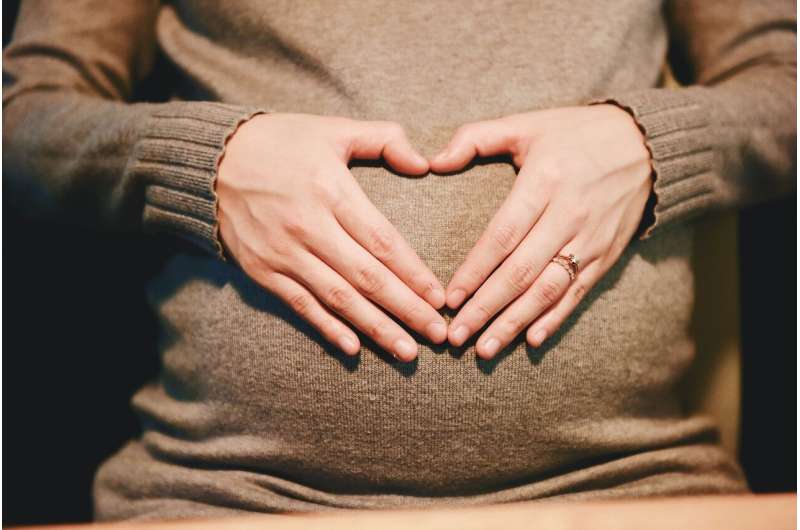This article has been reviewed according to Science X's editorial process and policies. Editors have highlighted the following attributes while ensuring the content's credibility:
fact-checked
trusted source
proofread
Mobile app helps predict future depression in pregnant people

A simple survey delivered during the first trimester through digital pregnancy support app MyHealthyPregnancy predicted which mothers went on to develop moderate to severe depression with a high level of accuracy, according to a new Archives of Women's Mental Health study led by University of Pittsburgh and UPMC researchers.
"Depression is a leading complication during pregnancy with about 15% of patients reporting symptoms at some point in their pregnancy journey," said lead author Tamar Krishnamurti, Ph.D., associate professor of general internal medicine at Pitt and investigator at Magee-Womens Research Institute.
"We already have great screening tools for active depression, but our approach is unique because it predicts who is likely to develop depression in the future. If we can identify people early on, before symptoms emerge, we might be able to tailor preventive care and offer tools and support to address underlying triggers of depression."
Krishnamurti and her team, who had previously developed the MyHealthyPregnancy app, analyzed data from 944 patients who used the app as part of a larger study and did not have a history of depression. During the first trimester, participants completed a survey that included questions about demographics, medical history, psychosocial factors, such as stress and feelings of sadness, and pregnancy-specific stressors, such as concerns about labor and delivery. A subset of patients also completed optional questions about health-related social factors, such as food insecurity. All participants completed verified depression screenings once per trimester.
After using 80% of the data to train six different machine-learning models, the researchers used the remaining 20% to test how well they were able to predict depression onset later in pregnancy. The best model was 89% accurate in predicting future depression and used only 14 of 55 possible variables, including anxiety history, partnered status, psychosocial factors and pregnancy-specific stressors.
As part of the research, the team worked with providers and perinatal individuals to review and refine the model so that it reflected their professional and lived experiences.
When the researchers included health-related social factors from the subset of participants who completed these questions, food insecurity emerged as an important risk factor for depression. When this variable was included in the model, race and income dropped out as important, and the model's accuracy increased to 93% with a total of just nine variables.
"We can ask people a small set of questions and get a good sense of whether they'll become depressed," said Krishnamurti. "Strikingly, a lot of risk factors for future depression are things that are modifiable—such as sleep quality, concerns about labor and delivery and, importantly, access to food—meaning that we can and should do something about them."
Perinatal depression is linked with poor outcomes for mom and baby, including higher rates of preterm delivery, delayed infant development and problems with mother-child bonding. While a history of depression is a strong predictor of perinatal depression, this tool could help identify others who become depressed for the first time during pregnancy.
Now, Krishnamurti and her team are developing approaches to integrate these screening questions into clinical workflows and identifying the best ways for clinicians to have conversations with patients about depression risk.
"We want to think carefully about how to talk with patients about depression risk as opposed to the active experience of depression," she explained. "For this information to be empowering and not anxiety-inducing, it's important that it's easy to understand and actionable. Our focus now is not just on refining our ability to predict depression, but also on improving and personalizing interventions so that they are most effective for any given individual."
Such interventions could include connecting people with resources in their area, recommending in-person maternal support groups that address pregnancy-related stressors or offering virtual, app-based therapy options.
Other authors on the study were Samantha Rodriguez, M.S., Priya Gopalan, M.D., and Hyagriv Simhan, M.D., M.S., all of Pitt or UPMC; and Bryan Wilder, Ph.D., of Carnegie Mellon University.
More information: Tamar Krishnamurti et al, Predicting first time depression onset in pregnancy: applying machine learning methods to patient-reported data, Archives of Women's Mental Health (2024). DOI: 10.1007/s00737-024-01474-w





















